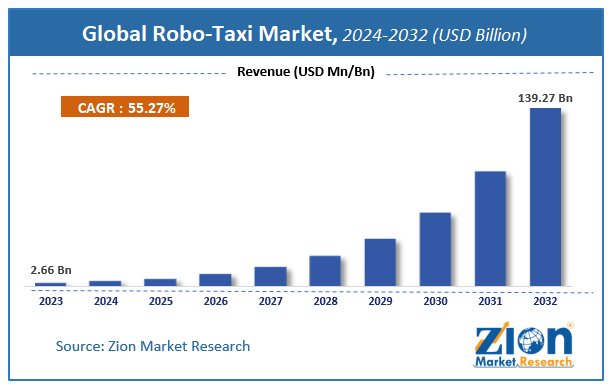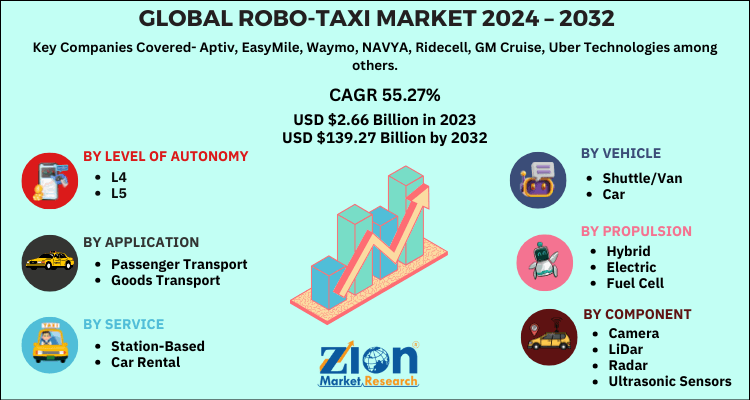Robo-Taxi Market Size, Share, Growth Analysis, Forecast Report 2032

Robo-Taxi Market By Level of Autonomy (L4 and L5), By Application (Passenger Transport and Goods Transport), By Service (Station-Based and Car Rental), By Vehicle (Shuttle/Van and Car), By Propulsion (Hybrid, Electric, and Fuel Cell), By Component (Camera, LiDar, Radar, and Ultrasonic Sensors), and By Region - Global Industry Perspective, Comprehensive Analysis, and Forecast, 2024 - 2032
| Market Size in 2023 | Market Forecast in 2032 | CAGR (in %) | Base Year |
|---|---|---|---|
| USD 2.66 Billion | USD 139.27 Billion | 55.27% | 2023 |
Robo-Taxi Market Insights
Zion Market Research has published a report on the global Robo-Taxi Market, estimating its value at USD 2.66 Billion in 2023, with projections indicating that it will reach USD 139.27 Billion by 2032. The market is expected to expand at a compound annual growth rate (CAGR) of 55.27% over the forecast period 2024-2032.
The report explores the factors fueling market growth, the hitches that could hamper this expansion, and the opportunities that may arise in the Robo-Taxi industry. Additionally, it offers a detailed analysis of how these elements will affect market demand dynamics and market performance throughout the forecast period.
The report offers valuation and analysis of Robo-taxi market on a global as well as regional level. The study offers a comprehensive assessment of the industry competition, restraints, revenue estimates, opportunities, current & emerging trends, and industry-validated market figures. The report offers historical data from 2018 to 2022 along with a forecast from 2024 to 2032 based on value (USD Billion).
Robo-Taxi Market: Overview
Escalating concerns over fuel emissions, road safety issues, and escalating popularity for ride-sharing vehicles will boost the market trends over the forecast period. Furthermore, self-driven cars are predicted to raise the cost of the fleet operators. This will help the market gain momentum over the forthcoming years. Apart from this, new business models such as “mobility as a service” can prove to be profitable & sustainable revenue source for the market over the coming years.
Moreover, the disruptive power of these self-driven taxis in autonomous driving is predicted to bring a paradigm shift in the automotive sector over the coming years. Furthermore, these new self-driven cars are expected to enhance the shared mobility and enable the vehicle connectivity. Additionally, these Robo-taxis will include electric powertrains that will reduce the operating costs for fleet authorities. Our report also provides the current developments taking place in the industry along with the competitive moves & strategies implemented by the market players to expand their business. Let us discuss about some of the reputed brands in the Robo-taxi industry.
Robo-Taxi Market: Growth Drivers
In last week of January 2020, Cruise LLC, an autonomous vehicle unit of General Motors Company, launched an autonomous all-electric ride-sharing shuttle developed in association with Honda Motor. The autonomous driverless vehicle referred as Origin is likely to be developed at the GM’s Detroit-Hamtramck factory in the U.S. Moreover, the introduction of the driverless vehicle is a part of the revitalization effort at the unit and GE has committed to spend USD 2.2 billion for building the electric & self-driven vehicles at the factory unit.
In January 2020, Waymo, the self-driving unit of Google’s parent firm Alphabet, partnered with UPS, a shipping & logistics firm based in the U.S., for testing of its autonomous delivery vehicles. Reportedly, Waymo’s autonomous vans referred as Chrysler Pacifica minivans will bring packaged from the UPS store sites at Metro Phoenix to a UPS sorting unit at Tempe, Arizona in the U.S. for processing purpose.
Robo-Taxi Market: Report Scope
| Report Attributes | Report Details |
|---|---|
| Report Name | Robo-Taxi Market |
| Market Size in 2023 | USD 2.66 Billion |
| Market Forecast in 2032 | USD 139.27 Billion |
| Growth Rate | CAGR of 55.27% |
| Number of Pages | 110 |
| Key Companies Covered | Aptiv, EasyMile, Waymo, NAVYA, Ridecell, GM Cruise, Uber Technologies among others |
| Segments Covered | By Level, By Application, By Service, By Vehicle, By Propulsion, By Component And By Region |
| Regions Covered | North America, Europe, Asia Pacific (APAC), Latin America, Middle East, and Africa (MEA) |
| Base Year | 2023 |
| Historical Year | 2018 to 2022 |
| Forecast Year | 2024 - 2032 |
| Customization Scope | Avail customized purchase options to meet your exact research needs. Request For Customization |
Robo-Taxi Market: Regional Analysis
Moreover, the European market is likely to have huge growth potential and is predicted to majorly impact the overall market revenue share over the forecast period. The growth is attributed to the presence of key players in the region along with easy availability of robust electric charging infrastructure facility in the region. Introduction of new models of electric vehicles by the firms like Tesla along with supportive government policies in Europe will boost the regional market growth.
Robo-Taxi Market: Competitive Analysis
Some of the leading players in the global market include:
- Aptiv
- EasyMile
- Waymo
- NAVYA
- Ridecell
- GM Cruise
- Uber Technologies
The global Robo-Taxi market is segmented as follows:
By Level of Autonomy Analysis
- L4
- L5
By Application Analysis
- Passenger Transport
- Goods Transport
By Service Analysis
- Station-Based
- Car Rental
By Vehicle Analysis
- Shuttle/Van
- Car
By Propulsion Analysis
- Hybrid
- Electric
- Fuel Cell
By Component Analysis
- Camera
- LiDar
- Radar
- Ultrasonic Sensors
By Region Analysis
- North America
- U.S.
- Europe
- UK
- France
- Germany
- Asia Pacific
- China
- Japan
- India
- Latin America
- Brazil
- Middle East and Africa
Table Of Content
Methodology
FrequentlyAsked Questions
A robo-taxi is a driverless, entirely autonomous vehicle that offers transportation services similar to those of a taxi. Advanced sensors, cameras, LiDAR, and AI-powered systems are integrated into these vehicles to facilitate the navigation and transportation of passengers without the need for human intervention. They are a component of the broader development of autonomous vehicles, which are intended to operate in urban environments. They are capable of picking up and dropping off passengers in the same manner as conventional taxis, but without the need for a driver.
The growth of the market will be substantially influenced by the regulatory frameworks that govern autonomous vehicles, such as safety standards, insurance policies, and liability concerns. Adoption may be expedited by supportive policies, while it may be impeded by restrictive regulations.
Zion Market Research has published a report on the global Robo-Taxi Market, estimating its value at USD 2.66 Billion in 2023, with projections indicating that it will reach USD 139.27 Billion by 2032.
Zion Market Research has published a report on the global Robo-Taxi Market a compound annual growth rate (CAGR) of 55.27% over the forecast period 2024-203
The growth is attributed to the presence of key players in the region along with easy availability of robust electric charging infrastructure facility in the region. Introduction of new models of electric vehicles by the firms like Tesla along with supportive government policies in Europe will boost the regional market growth.
Aptiv, EasyMile, Waymo, NAVYA, Ridecell, GM Cruise, Uber Technologies among others
RelatedNews
HappyClients
Zion Market Research
Tel: +1 (302) 444-0166
USA/Canada Toll Free No.+1 (855) 465-4651
3rd Floor,
Mrunal Paradise, Opp Maharaja Hotel,
Pimple Gurav, Pune 411061,
Maharashtra, India
Phone No +91 7768 006 007, +91 7768 006 008
US OFFICE NO +1 (302) 444-0166
US/CAN TOLL FREE +1 (855) 465-4651
Email: sales@zionmarketresearch.com
We have secured system to process your transaction.
Our support available to help you 24 hours a day, five days a week.
Monday - Friday: 9AM - 6PM
Saturday - Sunday: Closed






